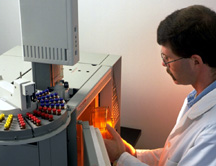 Purdue News
Purdue News
 Purdue News
Purdue News
February 13, 1998

|
"It's one of the few places entrepreneurs or small businesses can go for 'angel money,' or start-up capital that doesn't have to be paid back," says John A. Schneider, director of the Purdue Office of Industry Research and Technology Programs. "Entrepreneurs are partnering with universities to create new products and services, particularly in the business 'incubator' parts of the country, like the coasts and parts of Michigan, the Carolinas, Georgia, Utah and Texas."
Schneider says anyone with a small business (fewer than 500 employees) or an idea for a product can apply for a grant from participating government agencies such as the Department of Defense, the National Institutes of Health or NASA.
For example, someone with an idea for a new kidney dialysis machine might seek the grant from the appropriate health and human service-based government agencies.
"You don't necessarily have to be partnered with a university to receive these small business innovative research grants, but it sure helps," Schneider says. "And the Small Business Technology Transfer grants do require a university research partner.
"Because of that, we're starting to see an increase in new business start-ups among university faculty members. And that's a winning situation for everyone. The faculty member is able to market a new technology or invention while providing 'real world' research opportunities for university staff and students. The local economy benefits from the creation of new jobs, and the global community benefits from groundbreaking medical and technology-based research."
An example of the impact the grants and university partnerships can have on small business, Schneider says, is Bioanalytical Systems Inc. in West Lafayette, which manufactures instrumentation, develops software and provides services for biomedical and chemical research.
The university signed a sponsored research agreement with the company this week. The agreement will help both partners attract government grants. Bioanalytical Systems will have access to Purdue facilities, including equipment, laboratories, animal facilities and information services. Company employees also will benefit from interacting and collaborating with Purdue faculty, staff and students. It gives Purdue access to Bioanalytical Systems facilities and equipment for training and workshops. Purdue also gains employment opportunities for students.
Bioanalytical Systems was started by Purdue chemistry Professor Peter T. Kissinger in 1974 while he was teaching at Michigan State University. "I started the company with $365, and a handful of research assistants in Michigan," Kissinger says. "In 1975, I accepted a professorship with Purdue and moved the entire lab to West Lafayette in a U-Haul truck. We began by manufacturing measurement devices for electrochemical research done in the laboratories of pharmaceutical companies, medical schools and clinical laboratories. Now we have about 30 active medical diagnostic products on the market and are helping to test drug therapies for a variety of health concerns, including children's illnesses, HIV and Alzheimer's disease."
Kissinger and his staff initially worked part-time out of his and his co-workers' apartments. The first year's sales were around $17,000. In 1979, Bioanalytical Systems moved into its own 10,000-square-foot building at the Purdue Research Park, a business incubator site. Since then, the company has received a number of Small Business Innovative Research and Small Business Technology Transfer grants totaling more than $2 million; employed 200 people; increased its square footage to 110,000; and finished 1997 with more than $16 million in sales. The company's initial public stock offering in November raised $10 million, which will be used to retire debt, expand facilities and increase marketing efforts.
Purdue President Steven C. Beering says the Bioanalytical Systems partnership agreement is a model of how the university can work with and benefit industry of all sizes.
"Traditionally, small businesses have not been able to partner with universities because of very limited research budgets," he says. "But this agreement is an example of how both parties can benefit from and leverage each other's intellectual capital for research funding and real employment opportunities," he said. "It is our hope that this specific relationship will help us in developing new models to assist small, high-technology, businesses."
Sources: John Schneider (765) 494-0743; e-mail, jaschneider@sps.purdue.edu
Peter Kissinger (765) 463-4527; web, https://www.bioanalytical.com
Writer: Kate Walker (765) 494-2073; e-mail, kate_walker@purdue.edu
Purdue News Service: (765) 494-2096; e-mail, purduenews@purdue.edu
PHOTO CAPTION:
Scott Hessong, a scientist at Bioanalytical Systems Inc. in West Lafayette, uses a
gas chromotography instrument developed by the company. The business, started on
a shoestring in 1974, had $16 million in sales in 1997 thanks to a partnership between
Purdue University and its founder. (Bioanalytical Systems photo)
Color photo, electronic transmission, and Web and ftp download available. Photo ID:
Schneider.Bioanalytical
Download here.
 To the Purdue News and Photos Page
To the Purdue News and Photos Page